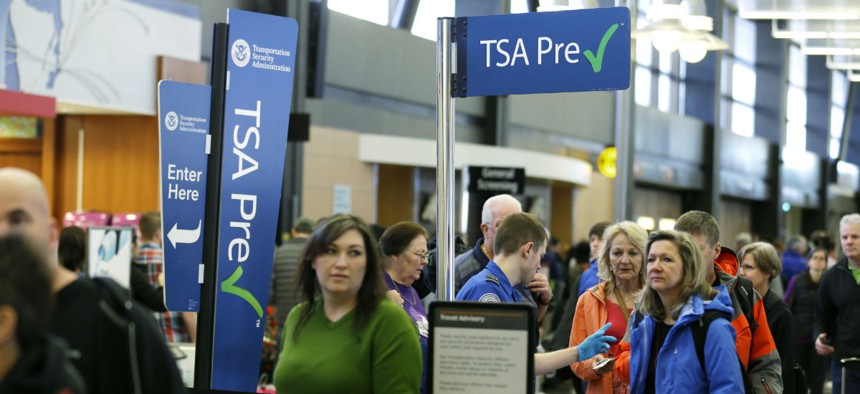Special Counsel Reverses Three TSA 'Wrongful Reassignments'
Whistleblowers who disclosed airport safety risks win settlement and damages.
Three Transportation Security Administration supervisors who were forced to relocate after disclosing airport safety risks won a reversal and compensatory damages, the Office of Special Counsel announced on Wednesday.
The terms of the settlement agreement crafted by the independent agency and TSA include compensatory damages of about $1 million combined for the three employees. The agreement also allows two of the complainants to return from their current posts in Seattle and Burbank, Calif., to “comparable positions in their native Hawaii,” OSC said in a release. “The overall value of these settlement agreements marks an achievement for OSC and demonstrates a significant step by TSA to make the employees whole.”
Supervisors Sharlene Mata, Heather Callahan Chuck and Frank Abreu previously were serving as deputy federal security directors in Hawaii, where they oversaw airport operations as part of TSA’s major division called the Office of Security Operations. In early 2014, as OSC recounted, two complainants made disclosures to TSA leadership, “including reports of mismanagement and lax airport security protocols. Shortly after, their subordinates raised concerns to TSA leadership about the efficiency and effectiveness of a regional restructuring plan.”
But TSA higher-ups criticized the complainants for poor leadership and quickly reassigned them to airports in Seattle, Los Angeles and Burbank, respectively. Hawaii natives Mata and Abreu were separated from their extended families by the involuntary moves, OSC noted. After several more reassignments, Callaghan Chuck ultimately resigned under duress.
“OSC’s involvement required the review of thousands of pages of material, interviews with two dozen witnesses and subjects, and the congressional testimony of my predecessor [Carolyn Lerner] before the House Oversight and Government Reform Committee more than a year ago,” said Special Counsel Henry Kerner in a statement. “This favorable outcome has been a long time in the making.”
He added that the three employees “had their lives thrown into disarray” and said he hoped that “this outcome will encourage others to speak up when they see something that could put the public at risk.”
TSA, according to the special counsel, has now discontinued its use of widespread geographic reassignments and created “a comprehensive internal training program on whistleblower retaliation.”
Rep. Elijah Cummings, D-Md., ranking member of the House Oversight and Government Reform Committee, praised OSC's action. "Today’s settlements are a victory for these whistleblowers and other whistleblowers throughout the federal government who rely on the Office of Special Counsel to protect their rights," Cummings said. "We on the Oversight Committee have been investigating problems at the TSA for several years, and it is clear that the agency needs major reforms to protect its employees and the public they are sworn to protect.”
Robert MacLean, a TSA whistleblower whose disclosure of security vulnerabilities prompted retaliation and a case that went all the way to the Supreme Court, told Government Executive on Wednesday that “the flying public should be exceptionally grateful that Special Counsel Henry Kerner is a whistleblower champion and knows how important it is for aviation security workers to report wrongdoing.”
But MacLean’s own reassignment issue has not been resolved, he said. “TSA continues to marginalize me by parking me in an empty room with no duties, and locking me out of its facilities to make me sit at home for two months in order to seek and pay for a private psychiatric examination while I was forced to exhaust my personal leave,” he said.
NEXT STORY: Agencies Need to Take More Risks in Acquisition




